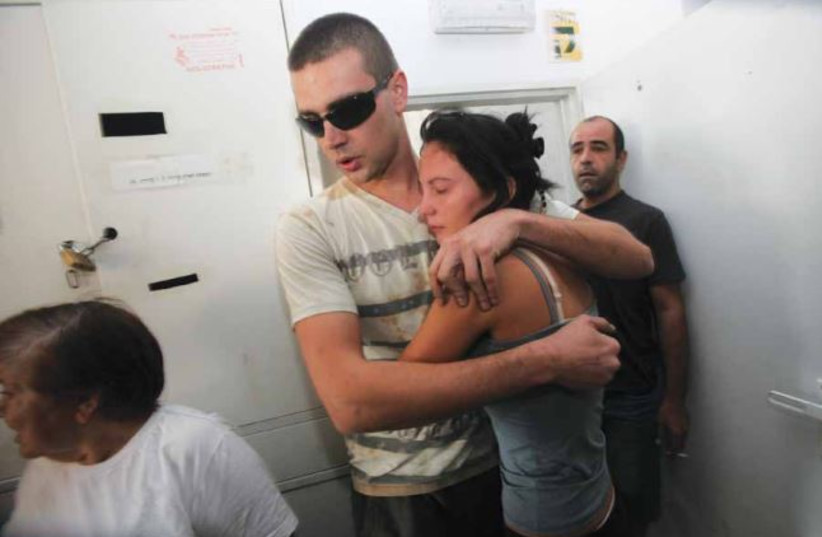Five hundred qualified therapists, clinical psychologists, and social workers with specialization in the field of trauma have joined a voluntary initiative to provide crucial mental support to those affected by the horrific attack on October 7th, when Hamas terrorists claimed the lives of over 1,300 people (many of them innocent civilians) and kidnapped over 120 more.
The “Tmicha B’cha” (Hebrew for “Supporting You”) project quickly connects individuals in need of support with an appropriate therapist in order to give traumatized victims access to therapy sessions via phone calls, video conferences, and in-person meetings. To date, over 500 such connections have been made, providing critical emotional assistance to those suffering from the traumatic events of the devastating pogrom.
Initially focusing on those who attended the ill-fated rave, the project has since expanded its reach. It now extends its support to anyone in need, including residents from the South and the North, children, soldiers, and more; the extensive roster of volunteer therapists ensures that help is available in a wide range of languages, with the goal of ensuring that no one affected by the trauma is left without help.
Mental health experts volunteer to aid Iaraeli trauma victims
The project was initiated by Sharon Assa, a senior producer at the hi-tech firm Mavens. It started as a response to the massacre which took place at a nature rave in the South at the time of Hamas’ infiltration. As a regular attendee of similar events, Assa was deeply affected by the news of the attack. “I felt like my heart was going to break. Like, really physically, I felt like my heart couldn’t handle it,” she told the Jerusalem Post.
Assa recognized the urgent need for psychological assistance for survivors, family members, and those who were exposed to the traumatic sights of the aftermath.

“In trauma, you need to speak as soon as possible after the traumatizing event,” she said. “On Saturday, I initiated the project by starting to find therapists — but I didn't want to find just any therapists, because I know that I could also cause damage if I didn’t find the right ones.”
In just one day, she organized a WhatsApp group that brought together more than 500 licensed trauma therapists. She was diligent in ensuring that these professionals were well-qualified, each holding a Master's degree in psychology and specializing in trauma therapy.
While the days since the attack have seen the growth of hundreds of grassroots aid efforts to assist those impacted by the tragic situation and the following war, Tmicha B’cha's strength lies in its extensive team of specialized therapists paired with its innovative technology. They've streamlined the process of connecting those in need with the right therapist, often within just a few minutes of filling out an online form.
That streamlined access to help has seen great results. “On the first day, we helped 100 people. On Sunday, we helped 100 more people. After three days we had helped 350 people from the party. And then we started to get requests to open the initiative to people who also weren't in the party,” Assa said. “Now, we’re focused on helping everyone who needs help in any way.”
Concerned citizens taking action
The project's commitment to providing ongoing care is evident. They do not set a limit on the number of therapy sessions, recognizing that some individuals may require long-term support. They're actively exploring options for donations to sustain this effort, ensuring that their services remain available for as long as needed.
“If they need 10 meetings, 20 meetings, all our therapists really want to stay with them and help them. We can follow up with them every day and see if they need help. We would not leave them without help,” she said. “For now, we talk with each one of them every day. Each therapist has few patients, so they help them and talk with them on a daily basis. It's really like having a new mom who checks on you every day and sees if you need professional help.”
Assa noted that her job at data-tech firm Mavens has been instrumental in the operation and management of the project. The company has given her extensive support to run Tmicha B’cha, providing resources, campaign funding, and creative assistance to help spread awareness about the initiative.
“I must say that Mavens gave us the opportunity to focus on helping the Israel community and do what we need in order to help. They helped me in spreading the initiative on social media, and they paid for the campaigns and their creative and design team helped me to come up with the logo and our marketing, and to come up with the name and slogan,” she said. “Because I have this amazing company, I’m allowed to focus on helping others.”
Those interested in applying for help from one of Tmicha B’cha’s licensed trauma therapists can do so by reaching out via whatsapp at +972 50‑686‑7607, or via the following link: https://bit.ly/support4u_il
